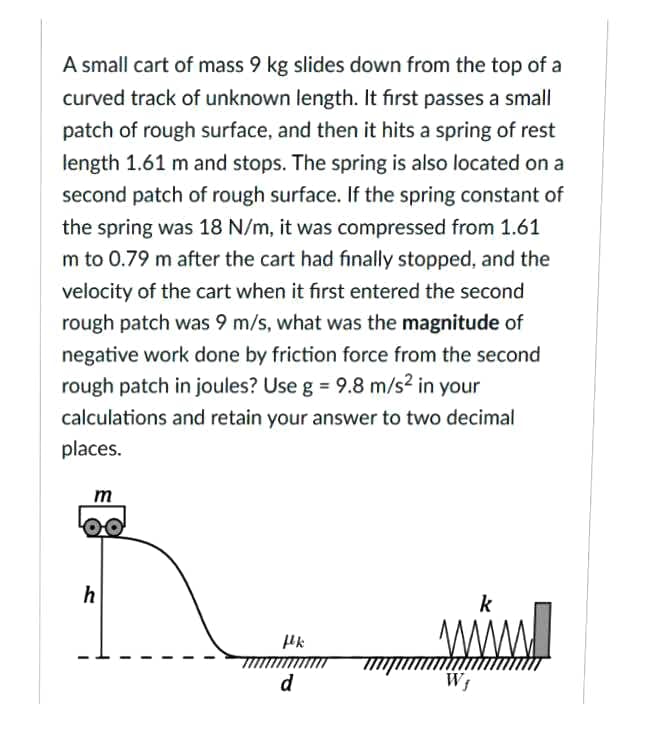A small cart of mass 9 kg slides down from the top of a curved track of unknown length. It first passes a small patch of rough surface, and then it hits a spring of rest length 1.61 m and stops. The spring is also located on a second patch of rough surface. If the spring constant of the spring was 18 N/m, it was compressed from 1.61 m to 0.79 m after the cart had finally stopped, and the velocity of the cart when it first entered the second rough patch was 9 m/s, what was the magnitude of negative work done by friction force from the second rough patch in joules? Use g = 9.8 m/s2 in your calculations and retain your answer to two decimal places.
A small cart of mass 9 kg slides down from the top of a curved track of unknown length. It first passes a small patch of rough surface, and then it hits a spring of rest length 1.61 m and stops. The spring is also located on a second patch of rough surface. If the spring constant of the spring was 18 N/m, it was compressed from 1.61 m to 0.79 m after the cart had finally stopped, and the velocity of the cart when it first entered the second rough patch was 9 m/s, what was the magnitude of negative work done by friction force from the second rough patch in joules? Use g = 9.8 m/s2 in your calculations and retain your answer to two decimal places.
University Physics Volume 1
18th Edition
ISBN:9781938168277
Author:William Moebs, Samuel J. Ling, Jeff Sanny
Publisher:William Moebs, Samuel J. Ling, Jeff Sanny
Chapter8: Potential Energy And Conservation Of Energy
Section: Chapter Questions
Problem 79AP: Consider a block of mass 0.200 kg attached to a spring of spring constant 100 N/m. The block is...
Related questions
Question

Transcribed Image Text:A small cart of mass 9 kg slides down from the top of a
curved track of unknown length. It first passes a small
patch of rough surface, and then it hits a spring of rest
length 1.61 m and stops. The spring is also located on a
second patch of rough surface. if the spring constant of
the spring was 18 N/m, it was compressed from 1.61
m to 0.79 m after the cart had finally stopped, and the
velocity of the cart when it first entered the second
rough patch was 9 m/s, what was the magnitude of
negative work done by friction force from the second
rough patch in joules? Use g = 9.8 m/s² in your
calculations and retain your answer to two decimal
places.
m
h
k
www
d
Expert Solution
This question has been solved!
Explore an expertly crafted, step-by-step solution for a thorough understanding of key concepts.
This is a popular solution!
Trending now
This is a popular solution!
Step by step
Solved in 2 steps

Knowledge Booster
Learn more about
Need a deep-dive on the concept behind this application? Look no further. Learn more about this topic, physics and related others by exploring similar questions and additional content below.Recommended textbooks for you

University Physics Volume 1
Physics
ISBN:
9781938168277
Author:
William Moebs, Samuel J. Ling, Jeff Sanny
Publisher:
OpenStax - Rice University

Principles of Physics: A Calculus-Based Text
Physics
ISBN:
9781133104261
Author:
Raymond A. Serway, John W. Jewett
Publisher:
Cengage Learning

Physics for Scientists and Engineers with Modern …
Physics
ISBN:
9781337553292
Author:
Raymond A. Serway, John W. Jewett
Publisher:
Cengage Learning

University Physics Volume 1
Physics
ISBN:
9781938168277
Author:
William Moebs, Samuel J. Ling, Jeff Sanny
Publisher:
OpenStax - Rice University

Principles of Physics: A Calculus-Based Text
Physics
ISBN:
9781133104261
Author:
Raymond A. Serway, John W. Jewett
Publisher:
Cengage Learning

Physics for Scientists and Engineers with Modern …
Physics
ISBN:
9781337553292
Author:
Raymond A. Serway, John W. Jewett
Publisher:
Cengage Learning

Physics for Scientists and Engineers
Physics
ISBN:
9781337553278
Author:
Raymond A. Serway, John W. Jewett
Publisher:
Cengage Learning

Physics for Scientists and Engineers, Technology …
Physics
ISBN:
9781305116399
Author:
Raymond A. Serway, John W. Jewett
Publisher:
Cengage Learning

Physics for Scientists and Engineers: Foundations…
Physics
ISBN:
9781133939146
Author:
Katz, Debora M.
Publisher:
Cengage Learning